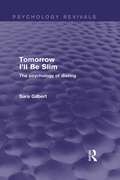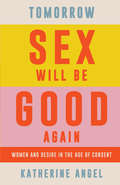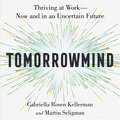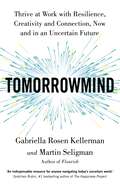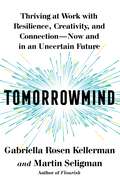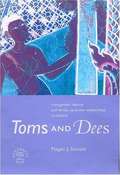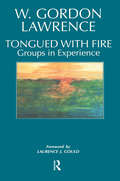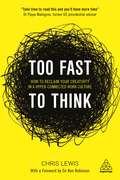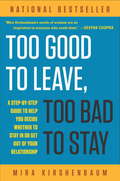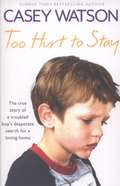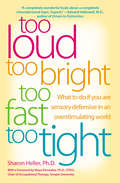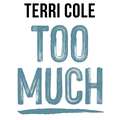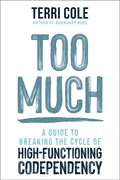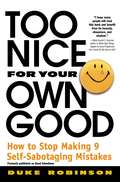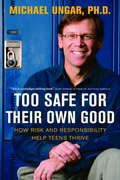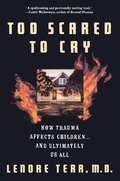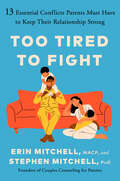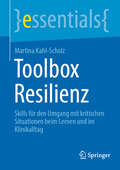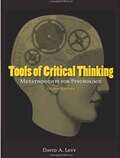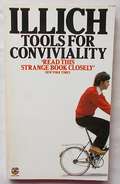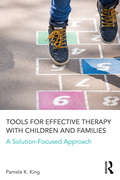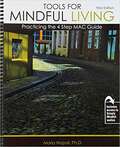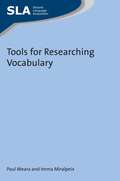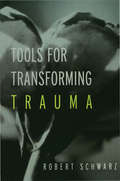- Table View
- List View
Tomorrow I'll Be Slim: The Psychology of Dieting (Psychology Revivals)
by Sara GilbertWhy do so many people try dieting, only to fail? What distinguishes those who succeed from those who do not? Are fat people really any different from thin people? What makes us eat, and how do we stop eating? And how can dieting trigger problems with eating normally? Originally published in 1989, Sara Gilbert discusses these questions in Tomorrow I’ll Be Slim, and draws on what is known about the psychology of eating, overeating, and weight control to dispel a number of popular myths about dieting. She shows how unsuccessful dieting can lead to new problems with eating and weight control. She points out that long-term success in slimming has more to do with individual factors such as a dieter’s expectations, self-confidence, or social and family circumstances than with ‘will-power’; and as much to do with how a diet is managed as with the content of a diet sheet. She suggests ways in which people who want to be slimmer can make a realistic assessment of their need to diet. She explains how individuals who seriously need to lose weight or change the way they eat might draw up effective strategies for themselves and prepare for the inevitable difficulties we all face whenever we try to change old habits. Finally, she addresses the problems of taking the emphasis off dieting and examining our attitudes to a slim figure as the key to happiness itself.
Tomorrow Sex Will Be Good Again: Women and Desire in the Age of Consent
by Katherine AngelA provocative, elegantly written analysis of female desire, consent, and sexuality in the age of MeTooWomen are in a bind. In the name of consent and empowerment, they must proclaim their desires clearly and confidently. Yet sex researchers suggest that women&’s desire is often slow to emerge. And men are keen to insist that they know what women—and their bodies—want. Meanwhile, sexual violence abounds. How can women, in this environment, possibly know what they want? And why do we expect them to? In this elegant, searching book—spanning science and popular culture; pornography and literature; debates on Me-Too, consent and feminism—Katherine Angel challenges our assumptions about women&’s desire. Why, she asks, should they be expected to know their desires? And how do we take sexual violence seriously, when not knowing what we want is key to both eroticism and personhood? In today&’s crucial moment of renewed attention to violence and power, Angel urges that we remake our thinking about sex, pleasure, and autonomy without any illusions about perfect self-knowledge. Only then will we fulfil Michel Foucault&’s teasing promise, in 1976, that &“tomorrow sex will be good again.&”
TomorrowMind: Thrive at Work with Resilience, Creativity and Connection, Now and in an Uncertain Future
by Martin Seligman Gabriella Rosen KellermanA future-proof guide to rehumanising the workplace in order to bring about greater personal success and corporate productivity, from two global authorities in workplace mental health.In recent years, workplace toxicity, industry volatility, employee isolation and technology-driven change have threatened the psychological well-being of employees. The rise of quiet quitting has shown that when we can't flourish at work, both personal success and corporate productivity suffer.As we sit on the cusp of some of the most turbulent economic changes in history many of us wonder if we can not only survive but flourish in our careers.Based on the science of thriving, Tomorrowmind proves we can and provides essential plans and actionable advice for succeeding in the uncertain future of work. Build skills in resilience, foresight and creativity and help to cultivate workplace that fosters connection and meaning for yourself and your team. Engaging evidence shows how individuals, teams, and organizations that excel at these five key attributes will win in the whitewater of work every time. A timely and crucial guide that is destined to inspire generations of workers.(P) 2023 Simon & Schuster Audio
TomorrowMind: Thriving at Work with Resilience, Creativity, and Connection—Now and in an Uncertain Future
by Martin Seligman Gabriella Rosen KellermanA future-proof guide to rehumanising the workplace in order to bring about greater personal success and corporate productivity, from two global authorities in workplace mental health.In recent years, workplace toxicity, industry volatility, employee isolation and technology-driven change have threatened the psychological well-being of employees. The rise of quiet quitting has shown that when we can't flourish at work, both personal success and corporate productivity suffer.As we sit on the cusp of some of the most turbulent economic changes in history many of us wonder if we can not only survive but flourish in our careers.Based on the science of thriving, Tomorrowmind proves we can and provides essential plans and actionable advice for succeeding in the uncertain future of work. Build skills in resilience, foresight and creativity and help to cultivate workplace that fosters connection and meaning for yourself and your team. Engaging evidence shows how individuals, teams, and organizations that excel at these five key attributes will win in the whitewater of work every time. A timely and crucial guide that is destined to inspire generations of workers.
Tomorrowmind: Thriving at Work with Resilience, Creativity, and Connection—Now and in an Uncertain Future
by Martin E. Seligman Gabriella Rosen KellermanA Greater Good magazine and Behavioral Scientist pick of 2023! Thrive in your career with this radical, future-proofed approach to work in a world where automation, globalization, and downsizing are an urgent and threatening reality—from experts in workplace mental health, Gabriella Kellerman, CPO of BetterUp, and world-renowned psychologist Martin Seligman.In recent years, workplace toxicity, industry volatility, and technology-driven turnover have threatened the psychological well-being of employees. When we can&’t flourish at work, both personal success and corporate productivity suffer. As we sit on the cusp of some of the most turbulent economic changes in history, many of us wonder how we can not only survive but flourish in our careers. Now, Tomorrowmind provides essential plans and actionable advice for facing the uncertain future of work. With in-depth and clear-eyed evidence, it offers key skills on everything from resilience and innovation to social connection and foresight. Cultivate a workplace that fosters connection and meaning for yourself or your employees with this timely and crucial guide that is destined to inspire generations of workers.
Toms and Dees: Transgender Identity and Female Same-Sex Relationships in Thailand
by Megan J. SinnottA vibrant, growing, and highly visible set of female identities has emerged in Thailand known as tom and dee. A tom (from tomboy) refers to a masculine woman who is sexually involved with a feminine partner, or dee (from lady). The patterning of female same-sex relationships into masculine and feminine pairs, coupled with the use of English-derived terms to refer to them, is found throughout East and Southeast Asia. Have the forces of capitalism facilitated the dissemination of Western-style gay and lesbian identities throughout the developing world as some theories of transnationalism suggest? Is the emergence of toms and dees over the past twenty-five years a sign that this has occurred in Thailand? Megan Sinnott engages these issues by examining the local culture and historical context of female same-sex eroticism and female masculinity in Thailand. Drawing on a broad spectrum of anthropological literature, Sinnott situates Thai tom and dee subculture within the global trend of increasingly hybridized sexual and gender identities.
Tongued with Fire: Groups in Experience
by W. Gordon LawrenceA volume of collected papers by one of the most prominent thinkers on psychoanalytic processes in organisations. The papers in this collection span two-and-a-half decades and address some of the most difficult, complex, and paradoxical aspects of the human condition.
Too Fast to Think
by Chris LewisOur lives are getting faster and faster. We are engulfed in constant distraction from email, social media and our 'always on' work culture. We are too busy, too overloaded with information and too focused on analytical left-brain thinking processes to be creative. Too Fast to Think exposes how our current work practices, media culture and education systems are detrimental to innovation. The speed and noise of modern life is undermining the clarity and quiet that is essential to power individual thought. Our best ideas are often generated when we are free to think diffusely, in an uninterrupted environment, which is why moments of inspiration so often occur in places completely separate to our offices. To reclaim creativity, Too Fast to Think teaches you how to retrain your brain into allowing creative ideas to emerge, before they are shut down by interruption, distraction or the self-doubt of your over-rational brain. This is essential reading for anyone who wants to maximize their creative potential, as well as that of their team. Supported by cutting-edge research from the University of the Arts London and insightful interviews with business leaders, academics, artists, politicians and psychologists, Chris Lewis takes a holistic approach to explain the 8 crucial traits that are inherently linked to creation and innovation.
Too Good to Leave, Too Bad to Stay: A Step-by-Step Guide to Help You Decide Whether to Stay In or Get Out of Your Relationship
by Mira KirshenbaumMira Kirshenbaum (I Love You, But I Don't Trust You), an international bestselling author and world-renowned therapist, draws on years of counseling experience to lead readers through relationship ambivalence. A careful line of 36 questions and self-analysis techniques designed to get to the heart of relationship and marriage problems. This straightforward and practical advice is designed for newer and older relationships, and presents a plethora of information and experience in a clear, concise manner. .
Too Hurt to Stay: The True Story of a Troubled Boy's Desperate Search for a Loving Home
by Casey WatsonEight-year-old Spencer takes himself to social services and demands to be taken into care.Casey is determined to try and understand what Spencer is going through and help him find the loving home he is so desperately searching for.
Too Loud, Too Bright, Too Fast, Too Tight
by Sharon HellerIn the publishing tradition of Driven to Distraction or The Boy Who Couldn't Stop Washing, this prescriptive book by a developmental psychologist and sufferer of Sensory Defensive Disorder (SD) sheds light on a little known but common affliction in which sufferers react to harmless stimuli as irritating, distracting or dangerous.We all know what it feels like to be irritated by loud music, accosted by lights that are too bright, or overwhelmed by a world that moves too quickly. But millions of people suffer from Sensory Defensive Disorder (SD), a common affliction in which people react to harmless stimuli not just as a distracting hindrance, but a potentially dangerous threat.Sharon Heller, Ph.D. is not only a trained psychologist, she is sensory defensive herself. Bringing both personal and professional perspectives, Dr. Heller is the ideal person to tell the world about this problem that will only increase as technology and processed environments take over our lives. In addition to heightening public awareness of this prevalent issue, Dr. Heller provides tools and therapies for alleviating and, in some cases, even eliminating defensiveness altogether.Until now, the treatment for sensory defensiveness has been successfully implemented in Learning Disabled children in whom defensiveness tends to be extreme. However, the disorder has generally been unidentified in adults who think they are either overstimulated, stressed, weird, or crazy. These sensory defensive sufferers live out their lives stressed and unhappy, never knowing why or what they can do about it. Now, with Too Loud, Too Bright, Too Fast, Too Tight, they have a compassionate spokesperson and a solution-oriented book of advice.
Too Much: A Guide to Breaking the Cycle of High-Functioning Co-dependency
by Terri ColeAre you the person everyone comes to when they're in a jam?Do you regularly accommodate others' needs and preferences?Does it feel like chaos will ensue if you don't handle the travel plans, divvy up the check at group dinners, sort out your friend's latest crisis, and so on?If these questions resonate, the odds are good that you are one of the overgiving, overextending individuals struggling with what psychotherapist and boundary expert Terri Cole has termed high-functioning codependency (HFC).When you hear the word codependent, you might think of the traditional enabler framework involving a hapless victim and their selfless rescuer. Terri certainly did. But after years in her therapy practice, she realized that many of her clients were presenting codependent behaviors that fell outside of the classic model.The ironic truth with HFC is that the more capable you are the more codependency doesn't look like codependency.In Too Much, you'll discover how to identify your HFC blueprint (or why you relate to others the way you do), the source of the attraction between codependents and narcissists, and how to cultivate emotional resiliency, practice real self-care, and much more.Each chapter includes tips, self-assessments, and exercises to help you transform how you see yourself and the world, avoid relapses, and stay centered in your own experience so that you can relate to others in a healthier way."How you feel, what you think, what you want matters. In fact, those things need to matter to you the most," writes Terri. "By choosing the path of healing and recovery, you are coming home to yourself." Here is a book for making the shift "from too much to just right," so you can live a life that's full of authenticity, freedom, and joy.
Too Much: A Guide to Breaking the Cycle of High-Functioning Co-dependency
by Terri ColeAre you the person everyone comes to when they're in a jam?Do you regularly accommodate others' needs and preferences?Does it feel like chaos will ensue if you don't handle the travel plans, divvy up the check at group dinners, sort out your friend's latest crisis, and so on?If these questions resonate, the odds are good that you are one of the overgiving, overextending individuals struggling with what psychotherapist and boundary expert Terri Cole has termed high-functioning codependency (HFC).When you hear the word codependent, you might think of the traditional enabler framework involving a hapless victim and their selfless rescuer. Terri certainly did. But after years in her therapy practice, she realized that many of her clients were presenting codependent behaviors that fell outside of the classic model.The ironic truth with HFC is that the more capable you are the more codependency doesn't look like codependency.In Too Much, you'll discover how to identify your HFC blueprint (or why you relate to others the way you do), the source of the attraction between codependents and narcissists, and how to cultivate emotional resiliency, practice real self-care, and much more.Each chapter includes tips, self-assessments, and exercises to help you transform how you see yourself and the world, avoid relapses, and stay centered in your own experience so that you can relate to others in a healthier way."How you feel, what you think, what you want matters. In fact, those things need to matter to you the most," writes Terri. "By choosing the path of healing and recovery, you are coming home to yourself." Here is a book for making the shift "from too much to just right," so you can live a life that's full of authenticity, freedom, and joy.
Too Nice for Your Own Good: How to Stop Making 9 Self-Sabotaging Mistakes
by Duke RobinsonIf you're like most folks, you were raised to be "nice." Yet now you find yourself asking: "If I'm so nice, why isn't my life better?" Renowned minister and lecturer Duke Robinson has the answer. Robinson says that well-intended behavior is essential to a humane society, but carries a down side. Being nice often means we take on too much, tell little lies, strive endlessly for perfection, and fall prey to other self-defeating behaviors. Now Robinson outlines the nine unconscious mistakes nice people make daily, and he shows how to correct them and avoid unnecessary stress with life-affirming actions. Learn how to: <P>Say "no" and save yourself from burnout<P>Tell others what you want, and actually receive it<P>Express anger in healing ways that maintain valued relationships<P>Respond effectively when irrationally criticized or attacked<P>Liberate your true self.<P>Are you, like many of us, too nice for your own good? This remarkable book will empower you to get what you need and deserve out oflife... and still be a nice person!<P>"I hope many people will find and read this book, and benefit from Duke Robinson's honesty, eloquence, and
Too Perfect: When Being in Control Gets Out of Control
by Allan E. Mallinger Jeannette De Wyze[From The Front Flap.] The rewards of perfectionism are obvious: success, financial security, the respect of friends and colleagues. But, inevitably, perfection comes at a price- too often, the loss of intimacy, emotional authenticity, and self-esteem. The tendency toward perfectionism and a host of related behaviors are hallmarks of the obsessive, a personality style that contributes to an outward appearance of poise, confidence, and strength but inwardly can cause anguish, suffering, and turmoil. The result of more than ten years of clinical research and observations from Dr. Allan Mallinger's private practice, Too Perfect helps identify the destructive patterns obsessives can unwittingly fall into, as well as the enormous emotional toll such behavior exacts on the obsessive and on friends and loved ones. From the compulsive worrier to the endlessly orderly "neat freak" and the driven workaholic, Dr. Mallinger shows how a disproportionate need for control-and an overwhelming fear of the uncertainty that exists in uncontrolled situations-can lead obsessives to adopt paralyzingly rigid roles almost like armor against life's uncertainties. But in ruling out the unexpected, these protective roles too often end up depriving the obsessive of emotional closeness, leisure time, an overall feeling of well-being-the very things the obsessive strives to ensure by virtue of his or her "flawless" performance in life. Fortunately, assures Dr. Mallinger, change is possible for even the most stubbornly resistant obsessive. Through both extensive case histories and specific suggestions for behavior modification, Too Perfect illustrates the road to change and offers hope to people who have sacrificed their right to happiness to their need to be right-and those who love them.
Too Safe for Their Own Good: How Risk and Responsibility Help Teens Thrive
by Michael UngarCanadian children are safer now than at any other time in history. So why are we so fearful for them? When they're young, we drive them to playdates, fill up their time with organized activity, and cocoon them from every imaginable peril. We think we are doing what's best for them. But as they grow into young adults and we continue to manage their lives, running interference with teachers and coaches, we are, in fact, unwittingly stunting them. Internationally respected social worker and family therapist Michael Ungar tells us why our mania to keep our kids safe is causing us to do the opposite: put them in harm's way. By continuing to protect them from failure and disappointment, many of our kids are missing out on the "risk-taker's advantage," the benefits that come from experiencing manageable amounts of danger. In Too Safe for Their Own Good, Ungar inspires parents to recall their own childhoods and the lessons they learned from being risk-takers and responsibility-seekers, much to the annoyance of their own parents. He offers the support parents need in setting appropriate limits and provides concrete suggestions for allowing children the opportunity to experience the rites of passage that will help them become competent, happy, thriving adults.In many communities, we are failing miserably doing much more than keeping our children vacuum-safe. They are not getting the experiences they need to grow up well. An entire generation of children from middle class homes, in downtown row houses, apartment blocks, and copycat suburbs, whose good fortune it is to have sidewalks and neighbourhood watch programs, crossing guards, and playground monitors, are not being provided with the opportunities they need to learn how to navigate their way through life's challenges. We don't intend any harm. Quite the contrary. In our mania to provide emotional life jackets around our kids, helmets and seatbelts, approved playground equipment, after-school supervision, an endless stream of evening programming, and no place to hang out but the tiled flooring of our local mall, we parents are accidentally creating a generation of youth who are not ready for life. Our children are too safe for their own good.
Too Scared to Cry: How Trauma Affects Children ... and Ultimately Us All
by Lenore TerrIn 1976 twenty?six California children were kidnapped from their school bus and buried alive for motives never explained. All the children survived. This bizarre event signaled the beginning of Lenore
Too Tired to Fight: 13 Essential Conflicts Parents Must Have to Keep Their Relationship Strong
by Stephen Mitchell Erin MitchellHow couples with kids can transform 13 common relationship fights into closer connection, from popular Instagram counselors Erin and Stephen Mitchell (@couples.counseling.for.parents).Parenting changes a couple&’s relationship in fundamental ways, but most parents are too exhausted from the demands of life, work, and engaging their kids to prioritize their relationship. This can lead to repeated conflict and an overwhelming sense of anxiety, anger, hurt, and loneliness…just when you need your partner&’s support the most. The good news: conflict is actually a sign that you are trying to connect with your partner—you&’re just stuck in an old pattern of communication.In Too Tired to Fight, Erin and Stephen Mitchell use their 20-plus years of counseling experience to walk couples through the 13 conflicts that are not just normal but necessary to keep a partnership strong once kids enter the picture, including: The &“Your Parenting Is Wrong&” ConflictThe &“I&’m More Tired Than You&” Conflict The &“Stop Choosing Your Family Over Ours&” Conflict The &“Sex Life? What Sex Life?&” Conflict In each scenario, they show how this conflict plays out—and offer scripts, questions for reflection, and their tried-and-true Conflict to Connection Equation that couples can use in the moment to communicate true repair and resolution. Their secret: by expressing your feelings and intentionally listening to your partner—not just venting or reacting to your stress-response system—you can work through the &“pain points&” of parenthood together and actually make your relationship happier and healthier as a result.
Toolbox Resilienz: Skills für den Umgang mit kritischen Situationen beim Lernen und im Klinikalltag (essentials)
by Martina Kahl-ScholzResilienz ist mittlerweile als Schlagwort überall da zu hören, wo Menschen sich Herausforderungen gegenübersehen – egal, ob das für den privaten oder beruflichen Bereich, für einzelne Personen, Teams oder ganze Unternehmen gilt. Resilienz ist aber kein Allheilmittel, das man sich im Vorbeigehen aneignen und dann jederzeit anwenden kann. Vielmehr beschreibt Resilienz eine innere Haltung, die sich allgemeinhin aus mehreren Bausteinen zusammensetzt – genau das gilt für die ureigene Widerstandskraft, um die es in diesem essential gehen soll, auch.Aus eigener Erfahrung beschreibt die Autorin, welche Herausforderungen das Medizinstudium und der spätere klinische Alltag bereithalten können – und dass man zwar theoretisch darauf vorbereitet sein kann, die praktische Erfahrung aber doch die Vorstellung davon meistens um Längen schlägt. Dieses essential soll eine kleine Hilfestellung bieten, um durch das Näherrücken an das Thema „Resilienz&“ einige Skills zu vermitteln, die das Lernen erleichtern und auch den Umgang mit kritischen Situationen im Klinikalltag einfacher machen. Damit hilft man als angehender Arzt/angehende Ärztin nicht nur sich selbst, sondern auch den Patienten, die man behandelt.
Tools Of Critical Thinking
by David A. LevyThis innovative text is designed to improve thinking skills through the application of 30 critical thinking principles—Metathoughts. These specialized tools and techniques are useful for approaching all forms of study, inquiry, and problem solving. Levy applies Metathoughts to a diverse array of issues in contemporary clinical, social, and cross-cultural psychology: identifying strengths and weaknesses in various schools of thought, defining and explaining psychological phenomena, evaluating the accuracy and usefulness of research studies, reducing logical flaws and personal biases, and improving the search for creative solutions. The Metathoughts are brought to life with practical examples, clinical vignettes, illustrations, anecdotes, thought-provoking exercises, useful antidotes, and contemporary social problems and issues. Tools of Critical Thinking, 2/E is primarily suited as a core textbook for courses in critical thinking/problem solving, or makes an ideal supplement in a wide variety of undergraduate and graduate psychology courses, including introductory psychology, abnormal psychology (psychopathology), cross-cultural psychology, theories and methods of psychotherapy, research methods and design, theories of personality, clinical practicum, and contemporary problems and issues in psychology.
Tools for Conviviality
by Ivan IllichA work of seminal importance, this book presents Ivan Illich's penetrating analysis of the industrial mode of production which characterises our contemporary world. The conviviality for which noted social philosopher Ivan Illich is arguing is one in which the individual's personal energies are under direct personal control and in which the use of tools is responsibly limited. This book claims out attention for the urgency of its appeal, the stunning clarity of its logic and the overwhelmingly human note that it sounds.
Tools for Effective Therapy with Children and Families: A Solution-Focused Approach
by Pamela K. KingTools for Effective Therapy with Children and Families provides mental health professionals with step-by-step tools and strategies for effective therapeutic outcomes with children and their families. An integration of solution-focused brief therapy and play therapy, this groundbreaking book is uniquely suited to clinicians working with school-aged children and their parents. Tools for Effective Therapy with Children and Families uses clearly articulated and creative play activities to elicit conversations about solutions, successes, and collaborative goals with clients. Session transcripts and technique illustrations throughout the chapters allow clinicians to see the solution-focused approach in action.
Tools for Mindful Living: Practicing the 4 Step MAC Guide
by Ph. D. Maria NapoliTools for Mindful Living: Practicing the 4 Step MAC Guide offers you an opportunity to understand mindfulness and identify markers on how stress impacts your life. <p><p> Each chapter offers the reader various opportunities to practice mindfulness using the simple and applicable 4 Step MAC Guide. Focusing on how one reacts or responds to their experiences and conscious attention to information communicated by one’s breath, senses, body, thoughts, emotions and instincts will be discussed throughout the book. <p><p> Discovering personal communication styles that impact every day occurrences and relationships will contribute to living mindfully. As you integrate mindfulness into your daily life, being present for all of your experiences without internal or external filters will become second nature. Get ready for a transformational ride!
Tools for Researching Vocabulary
by Paul Meara Imma MiralpeixThis book introduces an innovative collection of easy-to-use computer programs that have been developed to measure and model vocabulary knowledge. The book aims to help researchers discover new instruments for lexical analysis, and provides a theoretical framework in which studies with such tools could be conducted. Each of the programs comes with a short manual explaining how to use the program, an example of a published paper that uses the program and a set of questions that readers can develop into proper projects. The programs can be used in real research projects and have the potential to break new ground for research in L2 vocabulary acquisition. The book will be of great use to final year undergraduates and masters students in applied linguistics, second language acquisition, psycholinguistics and language testing and to PhD students doing research methods courses.
Tools for Transforming Trauma
by Robert SchwarzTools for Transforming Trauma provides clinicians with an integrative framework that covers a wide range of therapeutic modalities and a "black bag" full of therapeutic tools for healing trauma patients.
